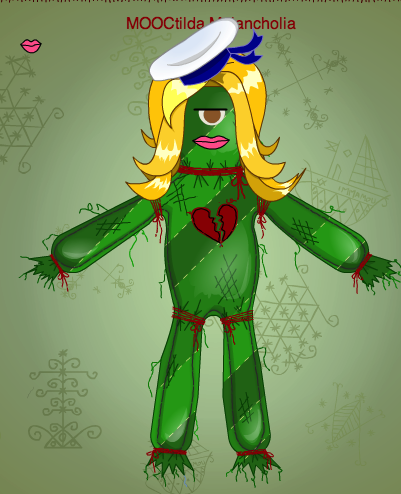 It seems like a class such as this, so formless in a way, shouldn’t work. There are no restrictions on who can join, no particular kind of creativity that is privileged. Talent is admired, but not really required, to make something cool. The Internet is full of fun applications now that make notions into striking products, like a word picture (Wordfoto) or a Voodoo Doll Maker (yeah, I tried it, and ended up making something weird but sweet. So sue me.) I cannot draw or sing well, or code, and my cooking is pretty rudimentary. But I can express my spirit, and sometimes that seems sufficient. As Peter Elbow says, “Everybody can write.” But everybody writes something new, even when it’s been said before. I realized earlier this year that the matter on the Internet is becoming a sort of emotional alphabet for the current generations. One of my students is a very gifted kid: medical researcher at 20, concert violinist, straight A student. In his digital story (Ying Tang’s digital story) he did an interesting thing. He found pictures of babies on the Internet to express emotions, so they became a kind of abc of feeling. He’s a pretty taciturn guy, but he figured out that he needed something other than words to share. Other students, too, will scour Google (hopefully, Creative Commons but whateva) to find images that evoke feelings: memes or sunsets or children or animals. It has to feel right or they discard it.
It seems like a class such as this, so formless in a way, shouldn’t work. There are no restrictions on who can join, no particular kind of creativity that is privileged. Talent is admired, but not really required, to make something cool. The Internet is full of fun applications now that make notions into striking products, like a word picture (Wordfoto) or a Voodoo Doll Maker (yeah, I tried it, and ended up making something weird but sweet. So sue me.) I cannot draw or sing well, or code, and my cooking is pretty rudimentary. But I can express my spirit, and sometimes that seems sufficient. As Peter Elbow says, “Everybody can write.” But everybody writes something new, even when it’s been said before. I realized earlier this year that the matter on the Internet is becoming a sort of emotional alphabet for the current generations. One of my students is a very gifted kid: medical researcher at 20, concert violinist, straight A student. In his digital story (Ying Tang’s digital story) he did an interesting thing. He found pictures of babies on the Internet to express emotions, so they became a kind of abc of feeling. He’s a pretty taciturn guy, but he figured out that he needed something other than words to share. Other students, too, will scour Google (hopefully, Creative Commons but whateva) to find images that evoke feelings: memes or sunsets or children or animals. It has to feel right or they discard it.
a blavatar in the blogosphere
cynthia davidson's word in the wall

It is the exercise of our creative genius, the spiritus mundi, that is necessary. From that springs skill and product. If we make and make and make some more we cannot help but find our way to that creative heart which no one knows better than ourselves. We just have to be willing to put up with other people’s judgments as we find that way. Sounds abstract but it is what we are trying on #clmooc. Fail, fail faster, fail better and then move on. Eventually we will end up being true to our own nature.
@tellio Making is best when the makers surprise themselves. Even the most gifted makers need to do that. It’s why assembly lines deaden people.
Absolutely, Cindy. I heard James Gee speak last week, and he argued that because 80+% of jobs in our economy don’t ask employees to make, participate, and contribute, we must learn to connect ourselves and our students to like-minded communities that recognize and respect our creativity and individuality– and encourage our humanity. Thanks for being part of this great experiment with us!
I had a quiet student in my class in spring who surprised me at the end of the semester when the class started working on web portfolios. When Tuo presented his work at the end, the way he talked to me made me think, gosh, I almost missed this guy talk. His explanation of why he chose the colors, images/artifacts, and design/navigation on his site made him sound smarter than an average graduate student of rhetoric. So, yes, I think that both our students and also we should express ourselves through more fun mediums than conventional writing/scholarship–especially writing for grades that end in the classroom. Here’s Tuo’s site: http://tuochen.wordpress.com/ Thanks for sharing a brief but thoughtful post.